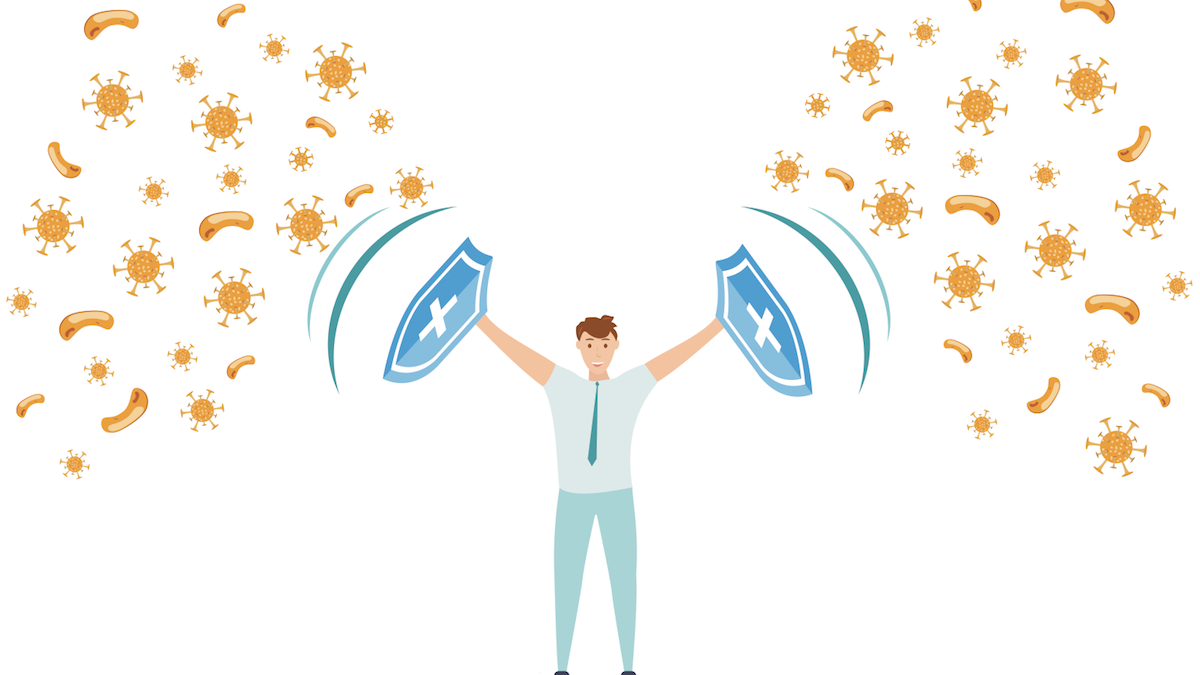Why Sleep and Exercise Are the Foundations of a Healthy Immune System

Most of us are well versed in the crucial practices of washing our hands and not touching our face by now, to protect ourselves from pathogens (a bacterium, virus, or other microorganisms that can cause disease) on a surface level. But it’s just as important to take care of our immune system, as this is what protects us from these pathogens.
The immune system is composed of various organs, white blood cells, and proteins called antibodies that work together against these pathogens that threaten the body. Basically, our immune system hunts down and kills viruses.
Some people may have a weakened immune system through underlying illness but for most people, our food and lifestyle choices can have a profound effect on our immune system. So even if we do catch anything, having a robust immune system means we’d have the ability to fight against it.
This is why we’ve put together a three-part guide on how you can strengthen your immune system, not just to help protect yourself against the recent coronavirus outbreak, but to also protect yourself through life. You can read the first part on why gut health is vital for a strong immune system here, and the second on the best immune-boosting foods and vitamins here.
Please note, our immunity system isn’t built overnight, it takes a continued effort to build it up. So the important thing is to start now.

Sleep And Your Immune System
The third and final part of this immune-boosting puzzle is less about what you’re putting into your body and more about what you’re doing with it.
Sleep is the crucial element here. The duration of your sleep and the quality of it is important. A 2017 study from the University of Washington, found that those who weren’t getting enough sleep were suppressing and harming their immune system and prolonging illness.
Our body releases and creates a protein called cytokines during sleep you see, and a lack of these proteins has been shown to compromise our immune system. Cytokines promote cell to cell communication and they direct cells to problematic areas to tackle pathogens. If we don’t have enough of this in the body, it will find it harder to fight against them.
As a whole most of us are all pretty sleep deprived unfortunately. The National Sleep Foundation recommends about 9 to 10 hours of sleep for teens, and 7 to 8 hours for adults.
But really, the reality is far from that. Data from the Centers for Disease Control, found that over the past century people in the United States are sleeping an estimated two hours less, while around one-third of the working population sleeps less than seven hours per night.

Minimise Your Stress
From fretting about work or the mortgage, to worrying about sweeping pandemics, stress plays a major part in why we can’t sleep. But even taken on its own, long-term stress can cause a lot of issues for your immune system.
Stress releases the steroid hormone cortisol, which actually helpfully reduces inflammation in short term situations. So when the dose of stress lowers, cortisol will too. But, if you’re constantly stressed out, cortisol will continue to produce and this can push inflammation levels up, which can strain and weaken the immune system. So while it’s okay to be stressed every now and again – if anything it can be quite helpful – you want to be minimising your stress over longer time periods.
Dealing with stress in this way is all about routine. Consider giving yourself a few hours before bed and do the things that feel relaxing to you – whether that’s reading a book, taking a bath, practicing some restorative yoga, or sitting down and meditating.
Exercise And Your Immune System
Another way to combat stress is through exercise. Physical activity improves your body’s ability to use oxygen and improves blood flow which has a direct effect on your brain. It also increases your brain’s production of mood-boosting endorphins.
And regular exercise is also also a big part of keeping your immune system ticking over. A 2020 study review from University of Bath, found that, in the short term, exercise can help the immune system find and deal with pathogens, and in the long term, regular exercise slows down changes that happen to the immune system with ageing, therefore reducing the risk of infections.

About 95 percent of infections start in the mucosal surfaces which include the eyes, nostrils and mouth. Our mucosal surfaces are protected by an antibody called immunoglobulin A (IgA) which neutralise and prevent viruses from getting into our system. These antibodies in our saliva are thought to be our first line of defence against infections like pneumonia and influenza.
Moderate exercise has been shown to boost these IgA levels and can reduce the chance of catching the flu. To test these IgA levels, a 2002 study from Brock University compared two groups, one sedentary and the other performed aerobic exercise for 30 mins, three times a week for 12 weeks. The group that exercised had a 50 percent increase in the levels of IgA in their saliva and were reported to have fewer respiratory infection symptoms.
Like a lot of things in life, moderation is key though, so working out harder won’t mean you’d see more benefits. It has been shown that overtraining and excessive stress can increase the risk of infections by impairing our immune function.
We wouldn’t advise anyone to go from a couch potato to running a marathon the next day either. This has been shown to have the opposite effect and has been shown to increase inflammation and lower your immunity, and would over-stress your body. Instead, aim to do regular exercise that is suited to your fitness and enjoyment.
This will all help to lower your stress hormone, and allow your virus-fighting cells to move through your body easier to do their jobs and get rid of those pesky pathogens. At the end of the day, all you can do is make sure you give yourself the best chance of fighting any virus that might come your way.


















